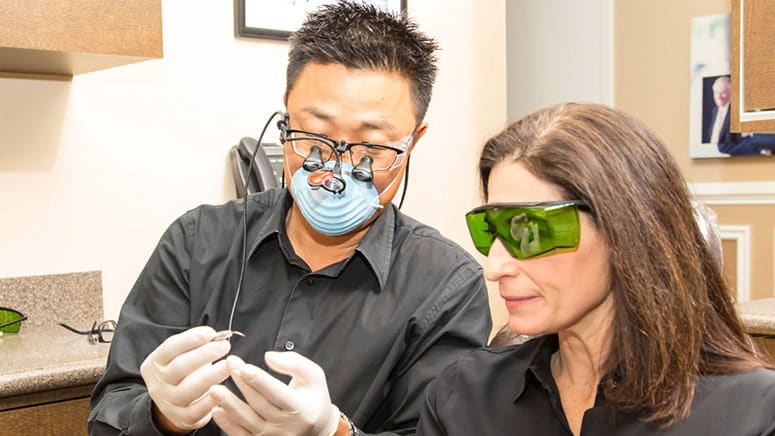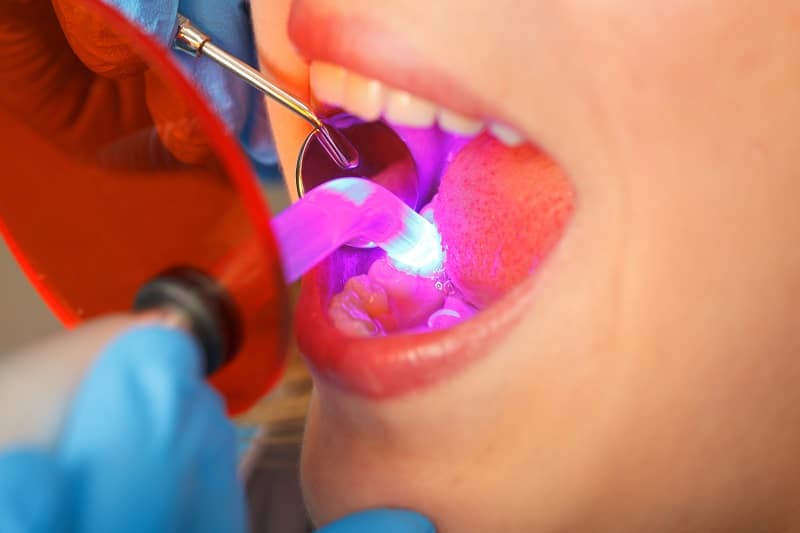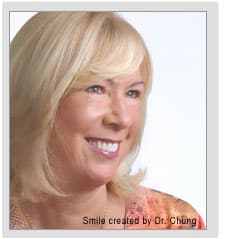
Dental bonding is a quick and easy procedure to improve minor aesthetic flaws in your teeth. This versatile cosmetic dental service can correct chipped, discolored, gapped, or otherwise imperfect teeth. Tooth bonding can help give you the confidence to flash your smile!
Dr. Michael Chung is an LVI-trained dentist with the skills and experience to transform your smile with dental bonding. Call our office at 703-319-6990 to arrange a consultation. Softouch Dental Care proudly serves patients from Oakton, Vienna, McLean, and nearby areas of Northern Virginia.
WHAT IS DENTAL BONDING?
Dental bonding is the process of applying, shaping, and hardening a composite resin on the surface of a tooth to repair it. The resin is color-matched for natural and undetectable results. It also forms a secure bond to provide lasting improvement. The procedure is quick, minimally invasive, and typically completed in a single visit.

WHAT CAN DENTAL BONDING TREAT?
Dental bonding can treat many different types of tooth damage and defects. It works best on minor concerns and may not be the best choice for a more significant correction.
Consider teeth bonding to address:
- Small gaps between front teeth
- Slight crookedness and misalignment
- Irregular tooth shape, size, or length
- Small chips or surface cracks
- Discoloration that won't respond to teeth whitening
- Cavities that need to be filled
IS DENTAL BONDING A GOOD OPTION FOR ME?

Tooth bonding is a good choice for anyone who wants to fix relatively minor dental problems. One dental bonding procedure can correct multiple imperfections quickly and easily.
For your front teeth, porcelain veneers could give you a more seamless look than dental bonding. And if your teeth are too misaligned and crowded, you might need Invisalign® to straighten them. Dr. Chung will recommend the best service based on your needs.
HOW IS DENTAL BONDING DONE?
Dental bonding is usually completed in a single visit. Dr. Chung will begin by choosing a resin shade that matches your natural teeth. Then, he will apply the composite material and mold it until it's the right shape and appearance.
When you and Dr. Chung are satisfied with the results, he will use a curing light to harden the bonding. After the resin sets, he'll polish it to blend nicely with your smile. You can then return to your daily routine with no downtime.
DOES DENTAL BONDING HURT?
Dental bonding is a painless procedure that’s simpler than other cosmetic options. It doesn’t require drilling, anesthesia, or multiple visits to our practice. Instead, bonding is a fast and non-invasive way to improve the appearance of your smile.
If you experience dental anxiety, we will be glad to give you a local anesthetic and mild sedative to help you relax.
IS COMPOSITE BONDING BETTER THAN VENEERS?
Composite bonding and veneers have their own benefits and considerations. One option is not universally better than the other, and they can both be used to correct the same minor defects.
There are differences in how the procedures are done, the visual results, and the longevity of the results. Here are some factors to think about:
- Treatment time: Dr. Chung applies dental bonding directly to your teeth in just one visit. Porcelain veneers are made in a dental laboratory and require two visits to complete.
- Appearance: Bonding is white and matches your natural teeth very well but is slightly lacking in terms of shine and transparency. Porcelain is partially translucent, like tooth enamel. Porcelain and natural teeth both absorb and reflect light in similar ways, and therefore look remarkably similar.
- Staining: Dental bonding will gradually discolor like your natural teeth. Pigments in food and drink, like coffee, cola drinks, and blackberries, will stain and yellow it. Porcelain is stain-resistant. It’s virtually unaffected by pigmented substances.
- Cost: Dental bonding costs significantly less than porcelain veneers. Remember that financing options are available at our practice.
TAKING CARE OF BONDED TEETH
Teeth that have been treated with bonding resin require the same care you give the rest of your teeth, like these basic guidelines:
- Maintain a good oral hygiene routine, complete with regular brushing and flossing.
- Avoid potentially harmful habits such as chewing on ice and pen caps.
- Visit our office for regular appointments so that we can monitor your oral health and the condition of your bonding.
WHY CHOOSE SOFTOUCH DENTAL?
At Softouch Dental Care, Dr. Michael Chung and our team provide quality care to every patient we see. With over 20 years of experience as an LVI-trained cosmetic and restorative dentist, Dr. Chung limits his schedule to two or three patients a day to allow for unhurried visits.
You'll enjoy our office's spa-like environment, complete with NuCalm™ relaxation systems, noise-canceling headphones, massage chairs, and warm blankets to for a truly calming experience. Dr. Chung’s holistic philosophy blends advanced cosmetic techniques with a focus on dental health, giving you the care you need for a healthy, radiant smile.
DENTAL BONDING QUESTIONS
Is Dental Bonding Affordable?
Many of our patients love dental bonding because it’s cost-effective. It’s significantly less expensive than other dental procedures, such as porcelain veneers or crowns. However, cost isn't the only factor to consider when choosing a dental treatment. Our financing options can help you afford the service that makes sense for you.
How Long Does Dental Bonding Last?
Dental bonding typically lasts three to 10 years, depending on your oral hygiene habits, diet, and the location of the bonding. Bonded teeth can be more susceptible to wear and staining, especially if you are a smoker or consume a lot of coffee, tea, or red wine. Proper care and regular dental check-ups can help extend the lifespan of your bonding.
Can Dental Bonding Be Redone or Touched Up if It Starts to Wear Down?
Yes, dental bonding can be redone or touched up if it shows signs of wear, chipping, or discoloration. The process is straightforward and usually involves adding a new layer of composite resin to refresh and restore the appearance of the tooth. Dr. Chung will assess the condition of your bonding during your routine visits to determine if a touch-up is necessary.
Is There a Difference Between Dental Bonding and Tooth-Colored Fillings?
While dental bonding and tooth-colored fillings use similar materials, they serve different purposes. Dental bonding is primarily a cosmetic procedure to improve the appearance of teeth by fixing chips, discoloration, or minor gaps. Tooth-colored fillings, on the other hand, repair cavities and restore the function of a decayed tooth. Despite these differences, both provide a natural-looking result that blends in with your smile.
Is Dental Bonding Covered by Dental Insurance?
Dental bonding may be covered by dental insurance if it’s for restorative reasons, such as repairing a decayed or fractured tooth. However, if the procedure is purely cosmetic, insurance coverage may be limited or unavailable. It’s best to check with your insurance provider to understand your specific coverage.
What Should I Do if My Bonded Tooth Feels Rough or Uneven?
Contact our office for an evaluation if your bonded tooth feels rough or uneven. In most cases, Dr. Chung can smooth and polish the bonding material to improve its feel and help it blend perfectly with the rest of your teeth.
SCHEDULE YOUR DENTAL BONDING CONSULTATION IN OAKTON
Call 703-319-6990 today to schedule a smile consultation for dental bonding or another cosmetic service. Softouch Dental Care welcomes patients from Oakton, Vienna, McLean, and nearby areas of Northern Virginia.

